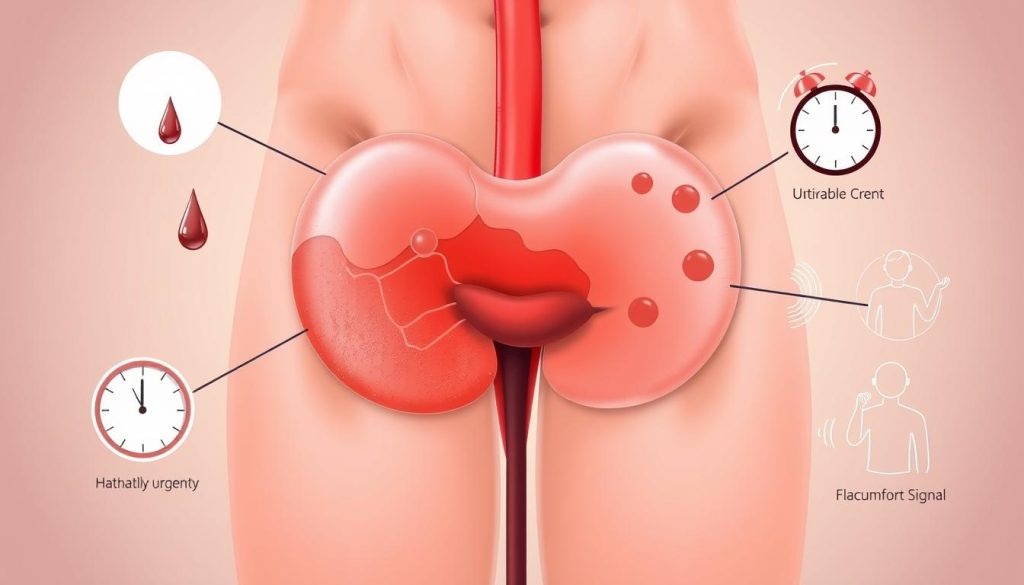Spotting bladder cancer early is key to effective treatment. Bladder cancer symptoms can start quietly, so being aware is important. Look out for changes in how you pee or blood in your urine.
These signs don’t always mean cancer, but they need quick doctor visits. Early detection can improve treatment results. Pay attention to your body and talk to a doctor if you’re worried.
Knowing the common signs helps you take care of your urinary health. Let’s look at the main signs of bladder cancer and when to see a doctor.
Understanding Bladder Cancer Symptoms: An Overview
Bladder cancer is a serious condition that affects thousands of Americans each year. Recognizing the signs of bladder cancer early can lead to better treatment outcomes. Let’s explore what defines this disease, how symptoms progress, and who’s at risk.
What Defines Bladder Cancer
Bladder cancer occurs when cells in the bladder grow uncontrollably. It typically starts in the lining of the bladder wall. As the cancer advances, it can spread to deeper layers and nearby organs.
How Symptoms Develop Over Time
Bladder cancer symptoms often start subtly and worsen as the disease progresses. Early signs may include blood in urine or changes in urination habits. As the cancer grows, pain and other symptoms can become more noticeable.
Risk Factors and Demographics
Certain factors increase the likelihood of developing bladder cancer. These include:
- Smoking
- Exposure to certain chemicals
- Chronic bladder inflammation
- Age (most cases occur in people over 70)
- Gender (men are more likely to develop bladder cancer)
| Risk Factor | Relative Risk Increase |
|---|---|
| Smoking | 3x higher |
| Chemical exposure | 2x higher |
| Chronic inflammation | 1.5x higher |
| Age over 70 | 4x higher |
| Male gender | 3.5x higher |
Understanding these factors can help individuals stay vigilant about possible bladder cancer symptoms. This way, they can seek timely medical attention when needed.
Blood in Urine: The Most Common Warning Sign
Blood in urine, known as hematuria, is a key sign of bladder cancer. It can show up in different ways, from visible changes to tiny traces found only in tests. Knowing these differences is key for catching bladder cancer early.
Visual Changes in Urine Color
Visible blood in urine might look pink, red, or cola-colored. This color change can be steady or come and go. If your urine looks different, see a doctor right away. It could mean you have bladder cancer.
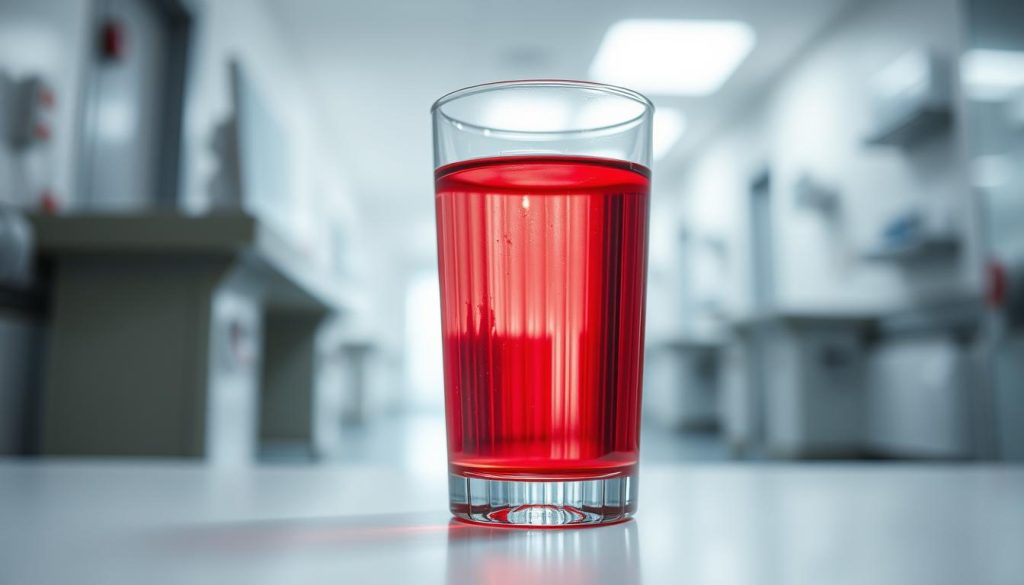
Microscopic Hematuria Detection
At times, blood in urine is not easy to see. Microscopic hematuria needs a test to find. Regular tests are important, mainly for those at risk of bladder cancer. They help catch this small but important symptom early.
When to Seek Medical Attention
Any blood in urine needs a doctor’s check. It might not always mean cancer, but it’s a sign that can’t be ignored. Quick medical care can lead to early diagnosis and better treatment if you have bladder cancer.
- Schedule an appointment if you notice any urine discoloration
- Don’t wait for other symptoms to appear before seeking help
- Be prepared to describe any changes in urination patterns to your doctor
Early detection of bladder cancer signs greatly improves treatment chances. Keep an eye on urine changes and take care of your urinary health.
Changes in Urination Patterns and Frequency
Bladder cancer symptoms often include noticeable changes in urination habits. One key sign is frequent urination, which can disrupt daily life and sleep patterns. People with bladder cancer may find themselves rushing to the bathroom more often than usual, even when they haven’t increased their fluid intake.
Urgency is another common issue. You might feel a sudden, intense need to urinate that’s hard to control. This urgency can be accompanied by a burning sensation or discomfort when urinating. Some individuals may also experience difficulty starting or maintaining a steady stream of urine.
It’s important to note that these changes can be subtle at first. You might dismiss them as temporary or age-related. But persistent alterations in urination patterns warrant attention, specially when combined with other bladder cancer symptoms.
| Urination Change | Potential Indicator of Bladder Cancer |
|---|---|
| Increased frequency | Yes, specially if unexplained |
| Sudden urgency | Yes, specially if persistent |
| Difficulty urinating | Yes, when combined with other symptoms |
| Burning sensation | Yes, if recurring or long-lasting |
While these urination changes can be caused by various factors, they shouldn’t be ignored. If you experience persistent alterations in your bathroom habits, specially in combination with other bladder cancer symptoms, consult your healthcare provider for proper evaluation and guidance.
Recognizing Pelvic Pain and Discomfort
Pelvic pain can be a worrying sign that might mean several health problems, like bladder cancer. It’s important to know the different kinds of discomfort and their patterns. This helps in catching issues early and getting the right medical help.
Types of Pelvic Pain
Pelvic pain from bladder cancer can show up in many ways. Some feel a dull ache, while others get sharp pains. The pain might stay the same or change. It usually happens in the lower belly or pelvis.
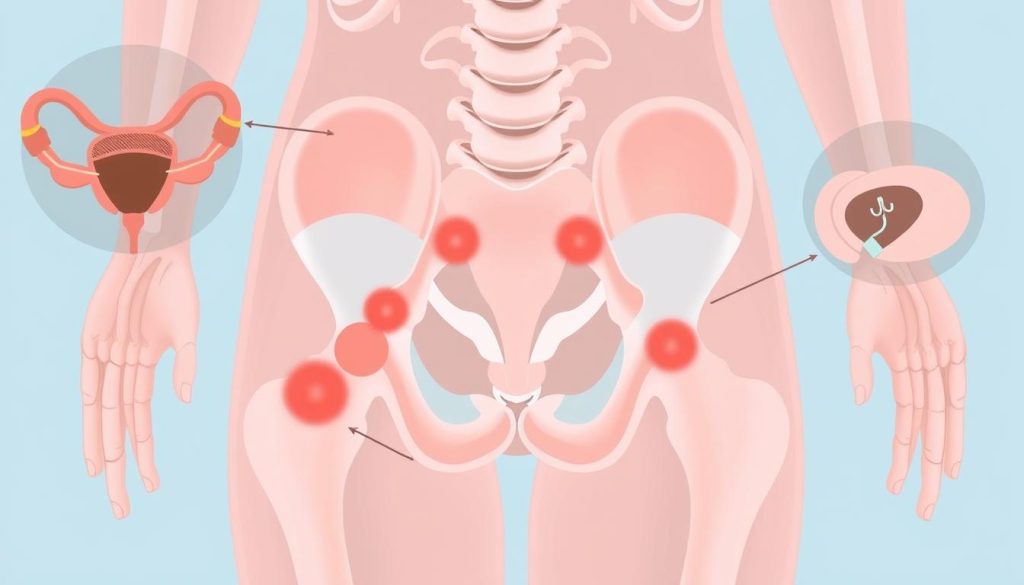
Associated Symptoms
Bladder cancer symptoms also include:
- Frequent urination
- Burning sensation during urination
- Blood in urine
- Difficulty emptying the bladder
Pain Patterns and Duration
The time and how often pelvic pain happens can vary. Some feel pain for a few days, while others have it for weeks or months. If you notice any unusual patterns or long-lasting pain, see a doctor right away.
Remember, pelvic pain can mean bladder cancer, but it can also mean other things. A doctor can figure out what’s causing it and suggest what to do next.
Distinguishing Between UTI and Bladder Cancer Symptoms
Urinary tract infection symptoms and bladder cancer symptoms can look similar. It’s important to know the differences to get the right treatment.
Urinary tract infections often cause a burning feeling when you pee. You might also need to pee a lot and have cloudy or smelly urine. These symptoms usually get better with antibiotics.
Bladder cancer symptoms are different. They often last longer. The main sign is blood in your pee, which can come and go. You might also feel pain in your pelvis, back, or have trouble peeing.
| Symptom | Urinary Tract Infection | Bladder Cancer |
|---|---|---|
| Blood in urine | Rare | Common |
| Pain during urination | Burning sensation | Discomfort or pain |
| Frequency of urination | Increased | Increased |
| Symptom duration | Short-term | Persistent |
| Response to antibiotics | Improves quickly | No improvement |
If your UTI symptoms don’t get better with treatment, or if you keep having bladder problems, see your doctor. They might do more tests to check for bladder cancer or other serious issues.
Back Pain as a Possible Warning Sign
Many people deal with back pain. But, did you know it might signal bladder cancer? Not all back pain is cancer, but knowing the difference is key for early detection.
Characteristics of Cancer-Related Back Pain
Back pain from bladder cancer is often different. It’s persistent and can get worse. The pain might spread from the lower back to the sides or pelvis. It’s often a dull ache that doesn’t get better with rest or pain meds.
Differentiating from Other Back Issues
It’s hard to tell if back pain is from cancer or not. Here’s a comparison to help you understand the differences:
| Characteristic | Cancer-Related Back Pain | Common Back Pain |
|---|---|---|
| Duration | Persistent, lasting weeks | Often improves within days or weeks |
| Response to Rest | Doesn’t usually improve | Often feels better with rest |
| Pain Pattern | Constant, may worsen at night | Can vary, often worse with activity |
| Associated Symptoms | May include blood in urine, fatigue | Rarely has other symptoms |
If you have ongoing back pain and other bladder cancer symptoms, see your doctor. Early detection is critical for better treatment outcomes.
Unexplained Weight Loss and Fatigue
When we talk about bladder cancer symptoms, weight loss and fatigue without reason are big concerns. These signs might mean the cancer has spread, affecting your whole body.
Weight loss without trying is a warning sign. If you lose weight fast without changing your diet or exercise, see a doctor. It’s your body’s way of telling you something’s off.
Fatigue that doesn’t get better with rest is another important symptom. It’s not just feeling tired after a long day. It’s a deep, ongoing tiredness that affects your daily life. When fatigue and unexplained weight loss happen together, you need to get medical advice.
Let’s break down these symptoms:
- Sudden weight loss without dieting
- Extreme tiredness that rest doesn’t fix
- Loss of appetite
- Feeling weak or drained
While these signs don’t always mean bladder cancer, they shouldn’t be ignored. Early detection can greatly improve treatment outcomes. If you notice these symptoms, and there are changes in how you urinate, see your healthcare provider.
| Symptom | Possible Cause | Action |
|---|---|---|
| Unexplained weight loss | Cancer, thyroid issues, diabetes | Consult doctor for evaluation |
| Persistent fatigue | Cancer, anemia, sleep disorders | Seek medical assessment |
| Combined weight loss and fatigue | Possible advanced cancer | Urgent medical attention needed |
Understanding Bone Pain in Advanced Cases
Bladder cancer can spread to other parts of the body, like the bones. Bone pain is a key symptom in advanced stages. Spotting this symptom early can help get better treatment faster.
Common Locations of Bone Pain
Bone pain from bladder cancer often happens in certain spots. The pelvis, lower back, and hips are common places. People might feel a deep, ongoing pain that doesn’t ease with rest or pain meds.
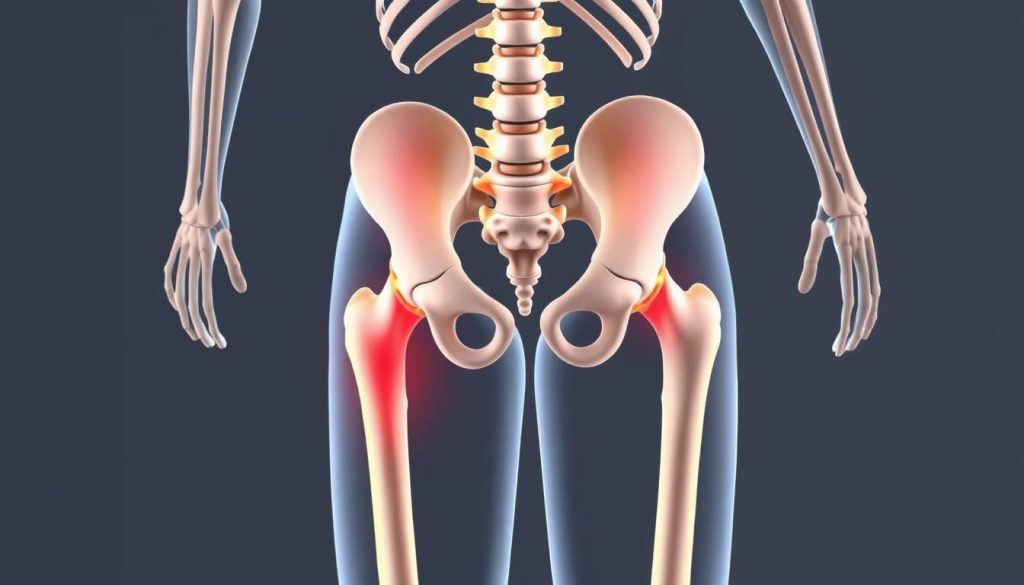
Progression Patterns
Bone pain in advanced bladder cancer changes over time. It might start as a mild ache and get worse. Some say the pain feels:
- Constant and dull
- Worse at night
- Increasing with movement
- Accompanied by weakness in the affected area
If you have ongoing bone pain, see a doctor right away. Bone pain doesn’t always mean cancer, but it’s a sign that needs checking. This is true if you’ve had bladder issues or risk factors for bladder cancer.
Early Detection Methods and Screening
Finding bladder cancer early is key to better treatment. Regular screenings and knowing the signs can help a lot.
Urine tests are often the first step in finding bladder cancer. They look for blood or abnormal cells in the urine. This could mean cancer is present. Doctors might suggest a urinalysis or urine cytology test to check cells more.
Imaging studies are also important for spotting bladder issues. Ultrasounds, CT scans, and MRIs give detailed images of the bladder. They help doctors find any growths or tumors.
Cystoscopy is a major tool for diagnosing bladder cancer. It involves putting a thin tube with a camera into the bladder. This lets doctors see the bladder lining for cancer signs.
- Urine tests for blood or abnormal cells
- Imaging studies like ultrasounds and CT scans
- Cystoscopy for direct bladder examination
Regular check-ups are vital, mainly for those at higher risk of bladder cancer. If you see blood in urine or changes in how you pee, see your doctor. Catching bladder cancer early can lead to better treatment and outcomes.
Risk Factors That Increase Symptom Awareness
Knowing the risk factors for bladder cancer can help you watch for signs. Some groups are at higher risk. It’s important to catch bladder cancer early.
Smoking and Tobacco Use
Smoking is the main risk for bladder cancer. Tobacco’s harmful chemicals can harm bladder cells. If you smoke, you’re two to three times more likely to get bladder cancer than non-smokers. Quitting can greatly lower your risk.
Age and Gender Considerations
Bladder cancer risk goes up with age. Most cases happen in people over 70. Men are about three times more likely to get it than women. But, women should also watch for signs, as they often get diagnosed later.
Occupational Hazards
Some jobs expose workers to chemicals linked to bladder cancer. High-risk jobs include:
- Rubber manufacturing
- Textile dyeing
- Painters
- Hairdressers and barbers
| Risk Factor | Relative Risk Increase | Key Bladder Cancer Symptoms to Watch |
|---|---|---|
| Smoking | 2-3 times higher | Blood in urine, frequent urination |
| Age (70+) | 15 times higher than age 30 | Pelvic pain, urinary changes |
| Male Gender | 3 times higher than females | Difficulty urinating, lower back pain |
| Occupational Exposure | Up to 2 times higher | Unexplained weight loss, fatigue |

If you have these risk factors, watch closely for bladder cancer symptoms. Early detection can lead to better treatment. Regular check-ups and talking to your doctor are important for managing risk.
When to Contact Your Healthcare Provider
Spotting bladder cancer symptoms early is key to better treatment. If you see any odd changes in your urine or health, call your doctor right away.
- Blood in urine, even if it’s just once
- Urgent or frequent need to pee
- Pain or discomfort in your pelvis
- Trouble peeing or weak urine
- Unexplained weight loss or feeling very tired
Before your visit, write down your symptoms. Note when they happen, how long they last, and what might make them better or worse. This info helps your doctor figure out what’s going on.
Keep in mind, these signs can also point to other health problems. They don’t always mean bladder cancer. But, it’s important to get them checked. Finding bladder cancer early can lead to better treatment and a better chance of recovery.
If you’re worried about your urine health, don’t wait. Your doctor is there to help with any bladder cancer concerns and keep you healthy.
Diagnostic Procedures for Suspected Cases
When doctors see signs of bladder cancer, they use different tests to confirm it. These tests help find bladder cancer symptoms and decide the best treatment.
Initial Tests and Examinations
The first step is a physical exam and urine tests. Doctors check for blood or abnormal cells in the urine. A urine cytology test looks for cancer cells from the bladder lining.
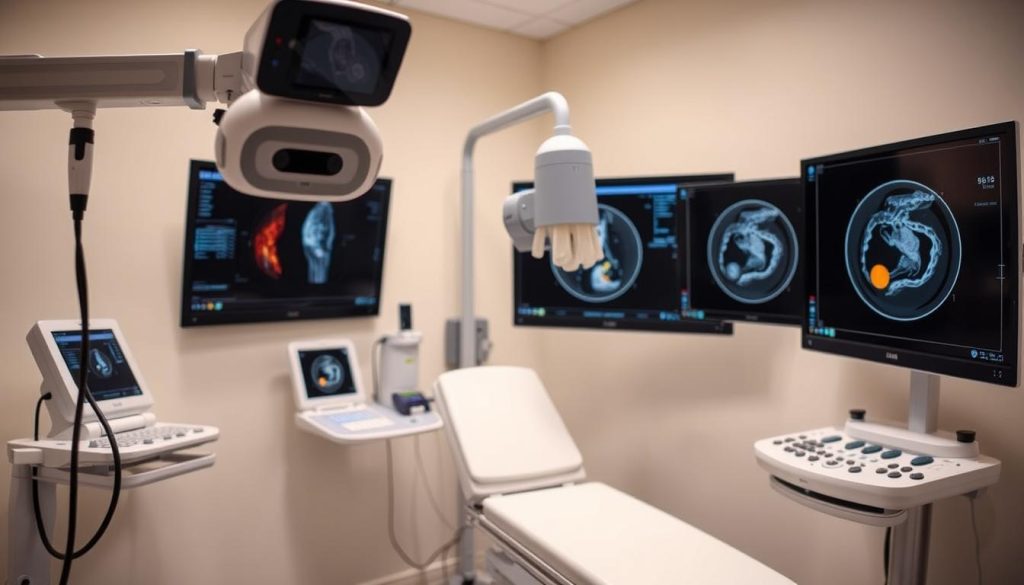
Advanced Imaging Options
If early tests show bladder cancer might be present, doctors use more detailed imaging. These include:
- CT urography: Detailed images of the urinary system
- MRI: High-resolution images of soft tissues
- Ultrasound: Sound waves to create images of the bladder
These methods help find tumors and see if cancer has spread.
Biopsy Procedures
A biopsy is key to confirming bladder cancer. Doctors do a cystoscopy, using a thin tube with a camera to look at the bladder lining. If they find something suspicious, they take tissue samples for lab tests. This helps figure out the cancer’s stage and grade, guiding treatment.
Prevention Strategies and Lifestyle Modifications
There are steps you can take to lower your risk of bladder cancer. While some risks are out of our hands, smart choices can help a lot.
Quitting smoking is very important. Smoking is a big reason for bladder cancer. Stopping can greatly reduce your risk. If quitting is hard, your doctor can help.
Drinking lots of water is also key. Water helps remove toxins from your bladder. This might lower the chance of cancer-causing substances staying in your body. Try to drink at least 8 glasses of water a day.
If your job exposes you to chemicals, be careful. Wear protective gear and follow safety rules. Jobs in textiles, rubber, and paint making are riskier.
- Eat a diet full of fruits and veggies
- Exercise to keep your immune system strong
- Drink less alcohol
- Go for regular check-ups, if you notice bladder cancer signs
By making these lifestyle changes, you can protect your bladder. Remember, catching problems early is very important. Watch for any unusual signs and see your doctor right away if you notice anything.
Treatment Options and Survival Rates
Bladder cancer treatment depends on the disease’s stage and severity. Catching bladder cancer early can lead to better outcomes. Treatments include surgery, which might remove the tumor or the whole bladder.
Chemotherapy or immunotherapy may also be used to fight cancer cells in the body. These treatments target cancer cells everywhere, not just in the bladder.
Survival rates for bladder cancer vary based on when it’s caught. If found early, the five-year survival rate can be up to 95%. This rate drops as the cancer advances.
This shows how vital it is to spot bladder cancer symptoms early and get medical help right away.
Every person’s battle with bladder cancer is different. Doctors tailor treatment plans to each patient’s needs. They consider the cancer type, stage, and overall health.
Regular check-ups and monitoring are key to the treatment. They help catch any cancer return early. By watching for symptoms and talking openly with doctors, patients can help their treatment and recovery.
FAQ
Q: What are the most common symptoms of bladder cancer?
A: Common symptoms include blood in urine and changes in how you urinate. You might also feel pelvic or back pain. Other signs are unexplained weight loss, fatigue, and bone pain in advanced cases.
Q: How is blood in urine related to bladder cancer?
A: Blood in urine, or hematuria, is often the first sign of bladder cancer. It can make urine look pink, red, or cola-colored. Seeing blood in urine means you should see a doctor right away.
Q: Can bladder cancer be mistaken for a urinary tract infection (UTI)?
A: Yes, bladder cancer symptoms can look like a UTI. Both can cause frequent urination and blood in urine. But, bladder cancer symptoms don’t go away with UTI treatment. If symptoms don’t improve, you might need to be checked for bladder cancer.
Q: Are there any early detection methods for bladder cancer?
A: Early detection includes urine tests and imaging studies. Cystoscopy is also used. Regular check-ups and quick action on symptoms are key for early diagnosis.
Q: Who is at higher risk for developing bladder cancer?
A: Higher risk groups include smokers and people over 55. Men are more likely to get it than women. Those with a family history or exposed to certain chemicals are also at risk.
Q: When should I see a doctor about possible bladder cancer symptoms?
A: See a doctor right away if you notice blood in urine or changes in urination. Also, if you have pelvic or back pain, or unexplained weight loss and fatigue. Early detection is important for treatment success.
Q: What diagnostic procedures are used to confirm bladder cancer?
A: Tests include urine tests, cystoscopy, and imaging like CT scans. A biopsy might also be needed. The tests depend on your situation and initial findings.
Q: Can lifestyle changes help prevent bladder cancer?
A: Yes, lifestyle changes can help. Quit smoking, drink plenty of water, and avoid harmful chemicals. Eating well and exercising can also help prevent cancer.












